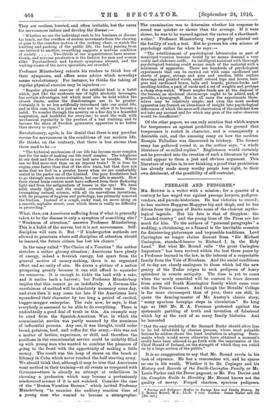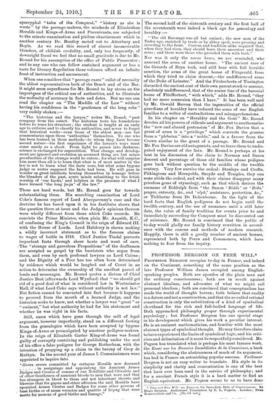PEERAGE AND PEDIGREE.*
MB. ROUND is a writer with a mission ; for a quarter of a century he has waged war against peerage lawyers, pedigree-
vendors, and pseudo-historians. He has victories to record ; he has smitten Hoggyns-Moggyns hip and thigh, and he has driven from the pages of Burke some of the choicest mytho- logical legends. But his fate is that of Sisyphus : the " Landed Gentry " and the young lions of the Press are too much for him. To the authors of " personal paragraphs " a wedding, a christening, or a funeral is the inevitable occasion for disinterring picturesque and impossible traditions. Lord Carrington no longer claims descent from "Sir Michael Carington, standard-bearer to Richard I. in the Holy Land." But what Mr. Round calls "the great Carington Imposture " has been revived within the last three years by a Professor learned in the law, in the interest of a respectable family from the Vale of Evesham. And the social conditions of to-day are closely analogous to those which led the new gentry of the Tudor reigns to seek pedigrees of hoary splendour in remote antiquity. The time is yet to come when the newly ennobled will be content to trace descent from some old South Kensington family which came over with the Prince Consort. And though the Heralds' College is far more circumspect than of yore, there are still, to quote the dancing-master of Mr. Anstey's classic story, " many spurious hornpipe steps in circulation." So long ago as 1865 Mr. E. A. Freeman protested against the systematic garbling of truth and invention of falsehood which lay at the root of so many family histories. And be lamented
"that the easy credulity of Sir Bernard Burke should allow him to be led blind-fold by obscure persons, whose most palpable fictions he seldom shows the least hesitation in adopting. State-. ments which would never otherwise have obtained a moment's credit have been allowed to go forth with the imprimatur of the Chief Herald of Ireland, on the strength of which they are relied on by a large section of the public."
It is no exaggeration to say that Mr. Round revels in his task of exposure. He has a remorseless wit, and he spares no one in his wrath. Whether it be Dr. Copinger and his History and _Records of the Smith.-Carington Family, or Mr.
Louis Parker and the Dover pageant, or Mr. Fox Davies and his Complete 6-icide to Heraldry, Mr. Round knows not the quality of mercy. Forged charters, spurious pedigrees, • Peerage and Pedigree : Studies in Peerage Law and Family History. By J. Horace Bound, 11.1., LL.D. 2 rots. London: James Nisbet and Co. [25s. net.]
apocryphal "tales of the Conquest," "history. as she is wrote "- by the peerage-makers, the misdeeds of Elizabethan Heralds and Kings-of-Arms and Pursuivants, are subjected to the minute examination and pitiless chastisement which in another century Dr. Bentley meted out to Atterbury and Boyle. As we read this record of almost inconceivable blunders, of childish credulity, and, only too frequently, of downright fraud we feel that no small gratitude is due to Mr. Round for his assumption of the office of Public Prosecutor ; and to any one who can follow sustained argument or has a taste for literary flagellation these volumes afford an infinite feast of instruction and amusement.
When one considers that " peerage cases " enlist of necessity the ablest representatives both of the Bench and of the Bar, it might seem superfluous for Mr. Round to lay stress on the importance of the critical use of authorities, and to illustrate the necessity of accuracy in facts and dates. But no one can read the chapter on " The Muddle of the Law " without having his confidence in the "gentlemen of the long robe" very rudely shaken :-
"The historian and the lawyer," writes Mr. Round, "part company from the outset. The historian tests his foundations before he rears his structure ; the student is taught at an early age to criticise and to classify his authorities, and never to forget that historical works—even those of the ablest men—are but commentaries upon those authorities ' themselves. To one who has been trained in these methods—to whom they have become second nature—his first experience of the lawyer's ways must come surely as a shock. From light he passes into darkness ; science is exchanged for superstition. That change and develop- ment are ignored and evolution an accursed thing are but minor peculiarities of the strange world he enters ; for ;hat will surprise him more than all is to learn that what is of most matter in the law is not to learn what the facts were, but what some bygone judge or writer supposed the facts bad been. He will gaze in wonder on great intellects bowing themselves in homage before the blunders of the past, acute minds submitting to the fetish worship of our hacks,' and helpless in the presence of what I have termed 'the long ju-ju ' of the law."
These are hard words, but Mr. Round goes far towards substantiating them. His searching examination of Lord Coke's famous report of Lord Abergavenny's case and the
doctrine he has based upon it in his Institutes shows that the question there at issue and the Judge's opinions thereon
were wholly different from those which Coke records. He convicts the Prime Minister, when plain Mr. Asquith, K.C., of confusing the King's Council in the reign of Edward HI. with the House of Lords. Lord Halsbury is shown making a wildly incorrect statement as to the famqus claims to wager of battle in 1818. Chief Justice Tindal perverts important facts through sheer haste and want of care.
The "strange and garrulous Propositions" of the draftsmen are accepted as gospel by the barristers who argue from them, and even by such profound lawyers as Lord Cairns ; and the Dignity of a Peer has too often been determined by evidence which would be laughed out of Court in an action to determine the ownership of the smallest parcel of lands and messuages. Mr. Round quotes a dictum of Chief Justice Best (afterwards Lord Wynford) that " we should get rid of a good deal of what is considered law in Westminster Hall, if what Lord Coke says without authority is not law." But fiction cannot be converted into fact because it happens to proceed from the mouth of a learned Judge, and the historian seeks to know, not whether a lawyer was "great " or " eminent," but what authority he had for his statement and whether he was right in his facts.
Still, cases which have gone through the mill of legal argument, however imperfectly, stand on a different footing from the genealogies which have been accepted by bygone Kings-of-Arms or promulgated by amateur pedigree-makers. In the reign of Elizabeth Garter King-of-Arms was found guilty of corruptly contriving and publishing under the seal of his office a false pedigree for George Rotherham, with the intention of propping up a claim to the barony of Grey de Ruthyn. In the second year of James I. Commissioners were appointed to inquire into
"divers errors committed by certayne Heralds now deceased in assigning° and appointyng the Auncient Armes Badges and Crestes of somme of our Nobillitie and Chivalric and of other Gentlemen of auncient bloode to men that were and that bee strangers in blood to them and not inheritant thereto and likewise that for gayne and other affection the said Heralds have apoynted Armes Creates and Badges for some other persons of base birthe or of mean vocation and qualitie of livyng that were
meete for persons of good birthe and linnage." • The second half of the sixteenth century and the first half of
the seventeenth were indeed a black age for genealogy and heraldry :— " The old Baronage was all but extinct ; the new men of the Tudor age, enriched by trade or by abbey spoil, were pressing and crowding to the front. Custom and tradition alike required that, when they had risen, they should have their ancestors and their arms ; and there were those who provided them with both."
Nor was it only the novus homo, we are reminded, who annexed the arms of another house. "The ancient race of
the Gerards of Bryn took, and still bear with full heraldic sanction, the arms of the great house of Fitzgerald, from which they tried to claim descent,—the undifferenced arms of the Duke of Leinster." And the Fitzherberts of Tissington discarded the ancient coat of their own parent stock to assume, absolutely undifferenced, that of the senior line of the baronial house of FitzHerbert, "with which," adds Mr. Round, "they had no more connexion than I have." It has been well said by Mr. Oswald Barron that the. ingenuities of the official guardians of heraldry have reduced the arms of our English families to a welter of contradictions and misapprehensions.
In his chapter on " Heraldry and the Gent " Mr. Round devotes all his powers of ridicule and argument to anathematise the " new and absurd pretension " of Mr. Fox Davies that a grant of arms is a " privilege " which converts the grantee from a "plebeian" into a "noble," and is a favour from the
Crown similar to the grant of a peerage. Mr. Round and Mr. Fox Davies are old antagonists, and we leave them to undis- puted enjoyment of the lists. Mr. Round is perhaps at his best in his discussion of the claim to Norman and Saxon descent and parentage of those old families • whose pedigree goes back without question to the middle of . the twelfth century. Very few survive the ordeal-: Stanleys and Crofts, Pilkingtons and Hornyolds, Sneyds and Temples, they can none abide the ordeal, and with their claims disappear many priceless gems of etymology, such as that' which derives the surname of Biddulph from " the Saxon 'Bidcle ' or Bida,' prayer, entreaty, &c., and ulph,' assistance, protection, &c.," or Tichborne from De Itchenhorne. In the light of the hard facts that English pedigrees do not begin until the twelfth century, and the use of surnames until a still later date, the value of family tradition for events prior to and immediately succeeding the Conquest must be discounted out of existence. Mr. Round is convinced that the public of to-day would gladly see family history rewritten in accord- ance with the canons and methods of modern research. Happily, there is still a goodly number of ancient houses, represented both by Peers and Commoners, which have nothing to fear from the inquiry.











































 Previous page
Previous page